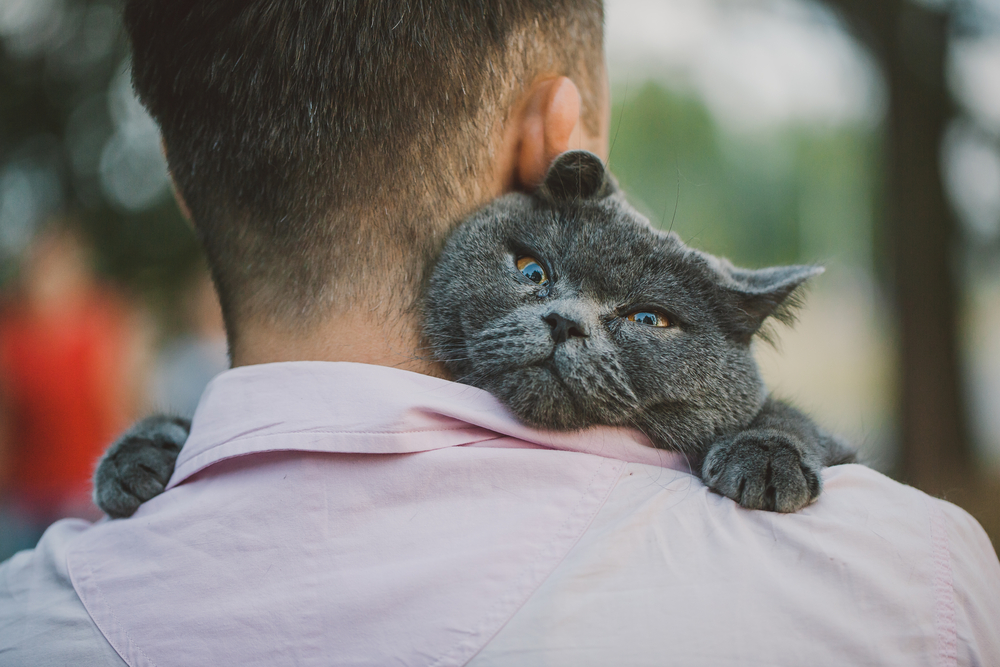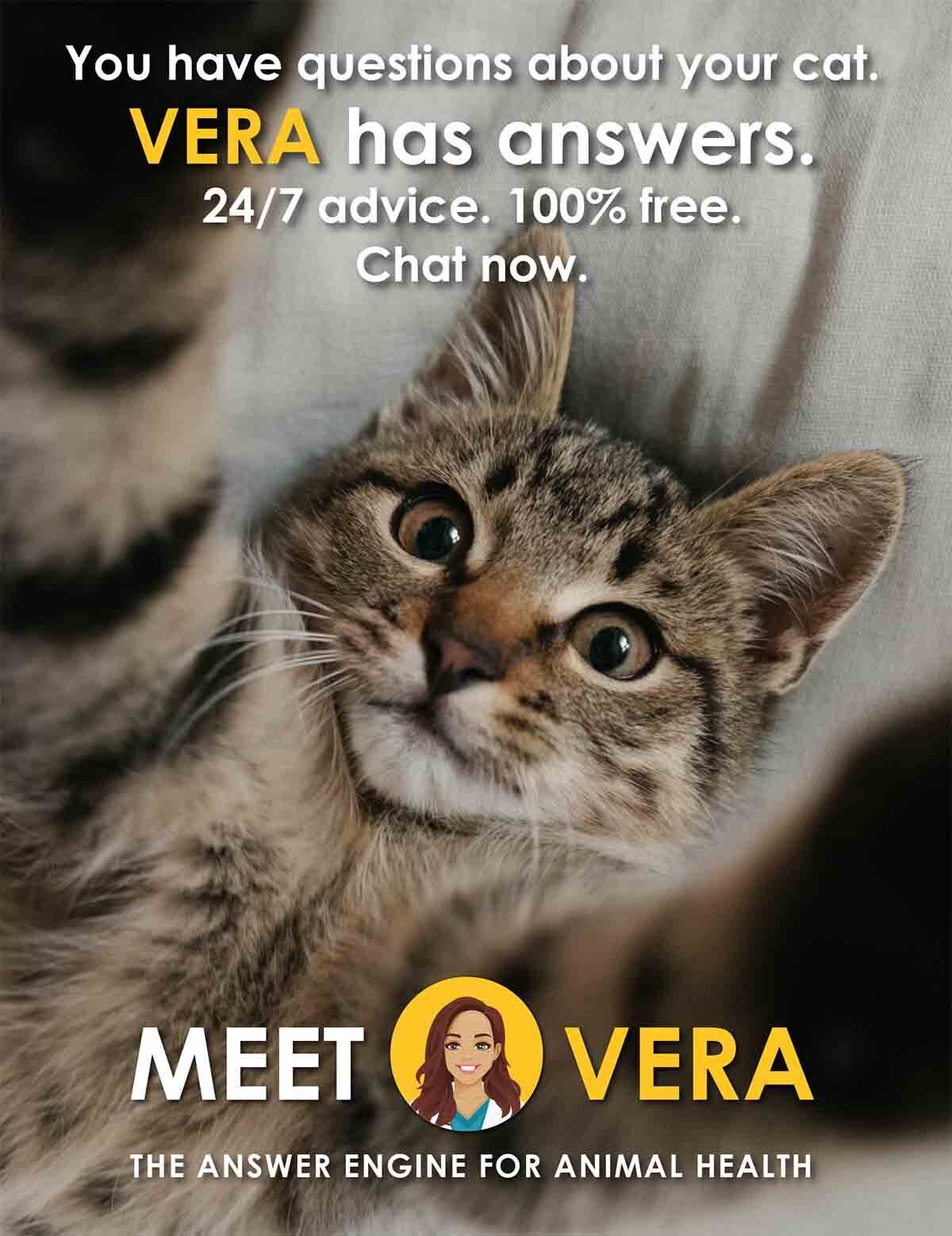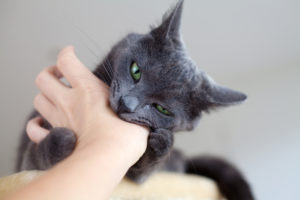If you are concerned that your favorite feline is experiencing stress or anxiety, what should you do? We are here to help! As we’ve discussed, kitty stress can lead to medical problems, as well as unwanted behavior that is destructive to your home and to your relationship. If your cat is exhibiting strange behavior, or you’re asking why does my cat randomly bite me, then keep reading! We’ll discuss how to pinpoint signs of stress in cats and how to soothe your feline friend to help them live their best life!
One of the most common causes of stress for kitties is boredom – just like we humans experience. It’s also important to understand that when a cat’s natural instincts are not able to be exercised, they can become anxious, stressed, and develop health problems. Natural cat instincts include scratching, hunting, sleeping, and litter box habits. Here’s a big secret: You may be able to resolve all of your cat’s stress just by providing some simple resources to help turn your home into a kitty paradise! These strategies encourage mentally stimulating activities which help with boredom and also allow your cat to express their natural urges in a healthy, fulfilling way.
Scratching Instincts
Most of us know the horror of walking in to find a favorite household item or piece of furniture partially shredded by our favorite feline. Why do they do this?! You probably know that cats scratch objects in order to leave their scent behind. Tiny scent glands in their paws are activated by scratching, and so when your “house panther” scratches an object, they are marking it as belonging to them and as part of their territory. Also, cat nails require regular scratching in order to shed the outer layers —similar to an onion–in order to keep them healthy. This means it’s essential for cats to have proper scratching areas, both for both their mental and physical health.
Some cats like to scratch on horizontal surfaces and some like vertical surfaces. You can purchase inexpensive versions of each type of scratcher and see which your cat utilizes more often—then invest in a longer-lasting version. (We like scratchers made out of sisal material, since it is effective, attractive to your cat, and lasts a long time!)
Place the new scratcher near your kitty’s favorite scratching spot, sprinkle it with catnip to make it attractive, and gradually move it away from the “unwanted” scratching object as your cat uses the scratcher, until the new scratcher is in its desired location. Depending on the size of your living space, you may want to incorporate multiple scratchers in your household. Fortunately, there are many attractive options on the market that can blend in with your home décor, or become a funny conversation piece!
Hunting
It’s hard to believe, but your cuddly kitty is actually a powerhouse predator inside. Her brain drives her to stalk, pounce, and catch her food prior to eating—and then sleep it off.
Cats who aren’t able to fulfill this sequence of events may become irritable or even aggressive towards humans and other animals in the house. To help your kitty express her true self, make sure to incorporate lots of playtime into her routine—and even around mealtime! Take advantage of some of the “feline foraging” toys that cats have to interact with in order to obtain their food, or one of the many food puzzles to choose from. Incorporating playtime before mealtime can also help satisfy your cat’s predatory urges.
Even if you can’t coordinate play sessions with mealtime, it’s important to carve out even just fifteen minutes a day to have a good-quality play session with your cat. Not only will it improve your bond, but it will help get those happy kitty endorphins flowing! Offer your cat multiple different types of cat toys and see which ones they like best. For some cats, this may mean toys that involve chasing (or even fetching). Other cats prefer “kickers,” or toys that they interact with while laying on their back and grabbing with their front paws while kicking with their back paws. (This adorable cat behavior is actually how cats “in the wild” kill some of their prey–but you can feel free to ignore that fact!) Still, other cats prefer toys they can play with in a solitary spot—like a ball that rolls around inside of a container. Find your cat’s preference and enjoy exploring different options together!
Sleeping
We all know how important a good night’s sleep is for our own mental health—and the same is true for our cats. Did you know that a healthy cat can sleep up to twenty hours a day? (And we are all jealous!)
It’s important for your kitty to have secure and safe spots in your home for napping. For some cats, this means perches up high (so they can survey their territory), and for others, this means a cozy “cat cave” in a quiet area of the house. Make sure to provide your cat with options for them to get away from the hustle and bustle of a busy household to get some much-needed rest.
Investing in a cat tree with platforms and cubbies, and strategically placing it near a window for some much-needed outside entertainment, can go a long way towards having a well-rested and content feline companion. These pieces of cat furniture also serve as an escape route for your cat, in case they are overwhelmed by something scary—like a vacuum cleaner, or a rambunctious child.
Litter Box Habits
You probably know that cats tend to be pretty picky about their bathrooms. Cats can become stressed if their litter box conditions are less than ideal. Make sure to have an appropriate number of boxes in your household—the number of litter boxes should be one more than the number of cats using them. Also, make sure the boxes are large enough to allow your cat to bury their scent, contain your cat’s preferred litter material, and are placed in locations far away from their food and water bowls. Since cats prefer to use the bathroom in a clean place, make sure to scoop your boxes twice a day.
Pheromones and Supplements
Although we try our best to provide our cats with feline paradise, sometimes they need a little extra help to find their mental happy place. Cats are creatures of habit, and when their routine is disrupted by changes that are normal to us humans—such as having overnight guests, renovating your home, adding a new pet to the household, getting ready for a move, or even rearranging the furniture—we can help minimize their anxiety.
Ask your veterinarian about certain calming supplements for cats, and whether they might be right for your kitty. While there are many over-the-counter chews and supplements for cats, the ones stocked by your veterinarian are proven to be the safest and most effective in promoting feel-good brain chemicals and relaxation. There is even a prescription food available that contains these soothing natural calming agents—and for some cats, this is a great solution to promote a calming effect and kitty bliss! By choosing scientifically studied nutraceuticals through your veterinarian, there is a higher likelihood of success in calming your cat.
When using supplements, keep in mind that it usually takes about four to six weeks of daily use, before your cat’s stress will be lowered and they will be overall happier and more calm. If you are planning on any major changes to your household (like those described above), it helps to start these supplements in advance, so by the time the stressful situation is happening, your kitty is already feeling happy and content.
A product called Feliway is available over-the-counter and can also be effective at making your cat’s stress disappear. Feliway is a cat pheromone, or scent used in communication, that imparts a message to your cats that “happy cats have been here, and everything is safe and wonderful!” Feliway is available in sprays that you can use in certain areas of your home, as wipes that can be used to instill loving messages inside of a cat carrier (or even your hands, if you’re dealing with a skittish cat), and as plug-in diffusers. People can’t smell Feliway, and we can see calming effects begin within minutes or even hours. It is safe, and can be used in combination with all of the other strategies we’ve discussed!
In some cases, cats have true mental health problems and are stressed because they are physiologically deficient in certain feel-good brain chemicals. In these cases, your veterinarian can help with behavior modification by prescribing antidepressant medications to your cat.
What to Do in the Moment?
If you’re faced with a cat who is suddenly visibly stressed and anxious, you may see their tail puff out like a hairbrush, flattened ears, dilated pupils, hissing, and swatting behavior. If this happens, being calm around your anxious cat is the key! Although it seems to be against our own natural instincts, try your best not to raise your voice, yell, or scream. A low-pitched voice and calm, slow speaking can go a long way towards settling down your cat.
Defuse the situation like a pro cat owner by walking slowly and calmly out of the room. If you have a cat toy nearby, slowly pick it up and try to distract the aggressive cat by playing with it, or by tossing a toy away from you so that you can safely leave the room. After your cat has calmed down, take a deep breath, and then try to figure out what may have caused your cat to suddenly become so upset.
The Bottom Line
The most common causes of feline stress and anxiety are elements within their own environment. Most commonly, cat anxiety is due to being unable to fulfill their natural kitty instincts, boredom, or because changes are occurring within the household. The good news is that most of this is within your control!
By using the tools we’ve outlined, you have the power to maximize your kitty’s full potential for a healthy and stress-free cat life with you.
Our AskVet Veterinarians are available to discuss all of your pet’s needs 24 hours a day, 7 days a week. Whether it’s learning why your kitty might be biting you, or understanding why a cat is pooping outside the litter box, just sign into your account and one of our friendly and knowledgeable veterinary experts will attend to your needs, no appointment required!
Written by:
Allison Ward, DVM
Dr. Allison Ward grew up in the suburbs of Washington, D.C. and started working in veterinary hospitals when she was 14 years old. After graduating from veterinary school in 2011, she completed a small animal rotating internship in New Jersey, followed by a neurology/neurosurgery internship in Miami. After completing this advanced training, Dr. Ward then moved on to general small animal practice. Dr. Ward’s professional interests include feline medicine, neurology, and pain management. Her passion for educating pet owners carries over into her work with AskVet, and she loves being able to help pets and their parents at all times of the day (and night!). She currently resides in sunny south Florida with her two cats, Larry and George.








